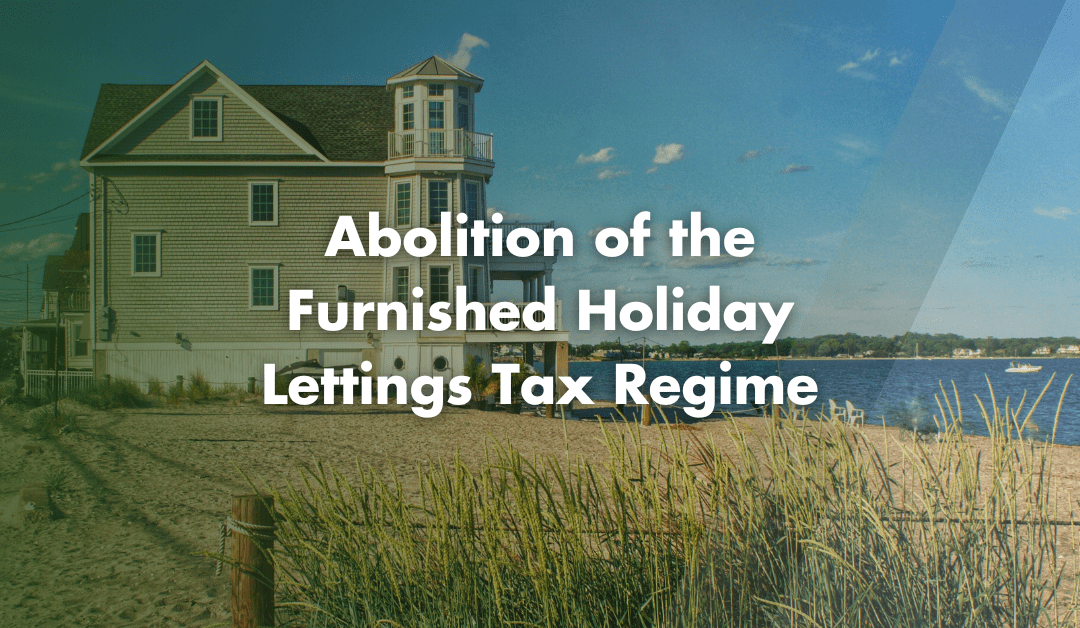Back in the Spring Budget 2024, the government announced the abolition of the Furnished Holiday Let (FHL) Tax Regime. Now, as of April 2025, the abolition has fully come into effect. From this date, HMRC will treat all income from these types of properties under the same rules as other residential rental income.
This change affects a wide range of landlords, from individuals to businesses and trusts. The goal of the abolition is to streamline the property taxation system and ensure all rental property owners receive the same treatment. It also aims to close perceived loopholes that gave some landlords a tax advantage over others.
What is a Furnished Holiday Let?
A Furnished Holiday Let is a short-term rental property. To qualify under current tax rules, the property must be available for rent for at least 210 days each year and actually let for a minimum of 105 days. However, it must not be useable for long-term lets of over 31 consecutive days for more than 155 days annually.
Why the Abolition of the FHL Tax Regime?
The government’s primary goal is fairness. FHLs used to receive better tax treatment than traditional residential rentals. This included:
- Deductions for full mortgage interest
- More generous Capital Gains Tax relief
- Access to Capital Allowances on property fixtures and furnishings
By removing these benefits, the government hopes to level the playing field. They also expect to raise a projected total of £355,000,000 in tax revenue by the 2027/28 tax year.
Lost Tax Benefits Since the Abolition of the FHL Tax Regime
With the abolition of the FHL Tax Regime, landlords will no longer enjoy the following advantages:
- Full Mortgage Interest Deduction – Landlords will now only receive a Basic Rate tax credit on 20% on costs
- Capital Allowances – Landlords will now only be able to claim “Replacement of Domestic Items Relief”, which does not cover the initial cost of furnishing a property
- Pension Contributions – Income from FHLs no longer qualifies as “earned income” so landlords can no longer make tax-advantaged pension contributions
- Business Asset Disposal Relief – Landlords can no longer use Business Asset Disposal Relief to get a 10% Capital Gains Tax rate, with the standard rate of 24% (or 18% for Basic-Rate taxpayers) now applying
- Rollover and Gift Relief – Landlords can no longer use Capital Gains Tax rollover or gift options
Losses and Profit Sharing
Under the old FHL regime, landlords could only carry forward losses and use them against future profits from the same FHL business. Now, they can use these losses against profits from other rental properties.
Previously, landlords could split profits into any ratio they chose, regardless of ownership shares, allowing their families or business partners to lower their collective tax bills. Now, profits will generally need to align with ownership percentages unless a legal agreement, such as a Declaration of Trust, states otherwise.
Changes to Stamp Duty Land Tax
In addition to the abolition of the FHL Tax Regime, the government also abolished the Multiple Dwellings Relief (MDR) for Stamp Duty Land Tax from 1st June 2024. MDR used to reduce Stamp Duty when buying two or more properties in a single transaction.
Now, linked transactions no longer apply for the old relief. Other Stamp Duty updates include exemptions for social housing providers and public bodies, and tweaks to first-time buyer relief for new leases held in trust.
Contact Us
We are not just accountants; we are Chartered Accountants with one of the most reputable and premium accounting bodies. We are registered and regulated by ACCA; so you can rest assured that you are in good hands. Knowing this, don’t hesitate to get in touch with us if you require assistance: Pi Accountancy | Contact Us

